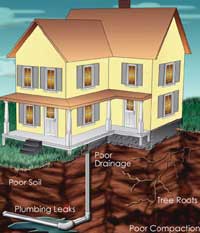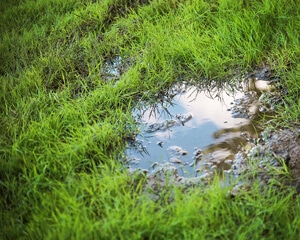Why is My Foundation Settling?
 At PEP Waterproofing, we offer a variety of patented and proven solutions to permanently fix foundation settlement issues with any size of structure – residential or commercial.
At PEP Waterproofing, we offer a variety of patented and proven solutions to permanently fix foundation settlement issues with any size of structure – residential or commercial.
The foundation is dependent upon the soil that surrounds it to hold the foundation in place. In theory this relationship should stand the test of time, however, the one variable that cannot be controlled is that the soil beneath and around the foundation is constantly changing. This is due to a variety of reasons.
Unstable Soil
Many clay-rich soils can be defined as “elastic” in nature. In other words, they expand and contract with moisture content. As soils become saturated with water, the clay expands and loses strength. This condition allows the foundation to sink much the same as you would standing in wet mud. Conversely, clay soils contract when moisture is taken away. Unfortunately the soils do not always loose moisture evenly, which allows one area to contract faster than another. The soils contract, the foundation loses needed support and therefore settles.
Poor Drainage
 Improper drainage can cause soil instability by creating localized areas of saturated soils, which softens the soils and allows the foundation to settle. Poor drainage can be due to the localized topography of the area, “French” drains that have become clogged with roots and soil, gutter down spouts, etc.
Improper drainage can cause soil instability by creating localized areas of saturated soils, which softens the soils and allows the foundation to settle. Poor drainage can be due to the localized topography of the area, “French” drains that have become clogged with roots and soil, gutter down spouts, etc.
Poor Compaction
Many homes are built on back-filled soils, which is a common and accepted building practice. However, care must be taken to properly compact the back fill before construction of the foundation. Improperly compacted back fill will slowly consolidate, sometimes over a period of years, which will allow foundation settlement.
Plumbing Leaks
Another potential reason for your foundation problem may be due plumbing leaks that allow water to saturate or erode the soil under or around your home. The water created from this problem is constant and will only continue to deteriorate the soil conditions around your home’s foundation.
Tree Roots
Many varieties of trees and large shrubs consume vast quantities of water. For example, some experts report that one large pine tree can remove as much as 30 gallons of water from the soil daily. If trees and large shrubs are located in close proximity to the foundation, excessive moisture loss can result. This will allow the soil to contract and the foundation to settle.
Frequently Asked Foundation Settlement Questions
- When should I be worried about foundation cracks?
Often times, as a home settles there will be small cracks that form and under many circumstances these are not dangerous and will have no future problems. You should be worried about foundation cracks when you notice they are growing over time or if the crack is not uniform in thickness, meaning it is wider at one end than the other. If you notice cracks getting larger or are different thicknesses throughout the crack, you should get in touch with a foundation repair professional to evaluate the cracks.
- Can foundation cracks be fixed?
Yes, foundation cracks can be fixed. Depending on the cause and severity of a crack, the repair method will change and it is best to have a professional inspect any foundation cracks you have.
- Can a sinking foundation be fixed?
Yes, a sinking foundation can be fixed. If you have a house and the foundation is sinking, there are a number of different causes from unstable soil to poor drainage to tree growth. If your foundation is sinking, you should contact a foundation repair professional to inspect the foundation and work with you to come up with a repair plan.
- What is the best foundation repair method?
Depending on the cause of the foundation problem, the best foundation repair method will vary. One of the most common foundation problems is sinking or settling. The best repair method for a sinking or settling foundation is to install a series of foundation piers. These are typically one of two types, push piers and helical piers. Different situations will call for the use of one or the other but the end result is the same, using the pier to support the sinking part of the foundation by lifting and leveling it back to the correct location.
- What causes cracks in a home or an office building’s foundation?
Cracks in a foundation are caused by several things. The most probable is that the foundation has been subjected to the soil around it expanding and contracting around it. It could also be due to clay or sand expansion. Hydrostatic pressure can also crack a foundation, as well as tree roots or settlement from poor compaction.
- Will piles stop all settlement of the structure in the future?
Once the home’s foundation has been piered the opportunity of movement/settling in the repaired area is extremely unlikely… so unlikely that many installing contractors guarantee the areas they pier with a Lifetime Warranty. The same cannot be said about areas that are not piered, but representatives try to identify all problem areas and suggest the most comprehensive repair to avoid future problems.
- Will all cracks in the brick walls close once the foundation is corrected?
If you mean will they close to the exact position they once were, probably not. Drive Rite technicians are absolute experts at knowing when and if it’s possible. However, to what extent cracks will close is impossible to predict. Many close completely. Most Drive Rite installing contractors’ standard procedure is to tuck point any remaining cracks, and the areas repaired are then warranted according to your installer’s contract.
If you have any questions just call us or learn about our repair methods here.
